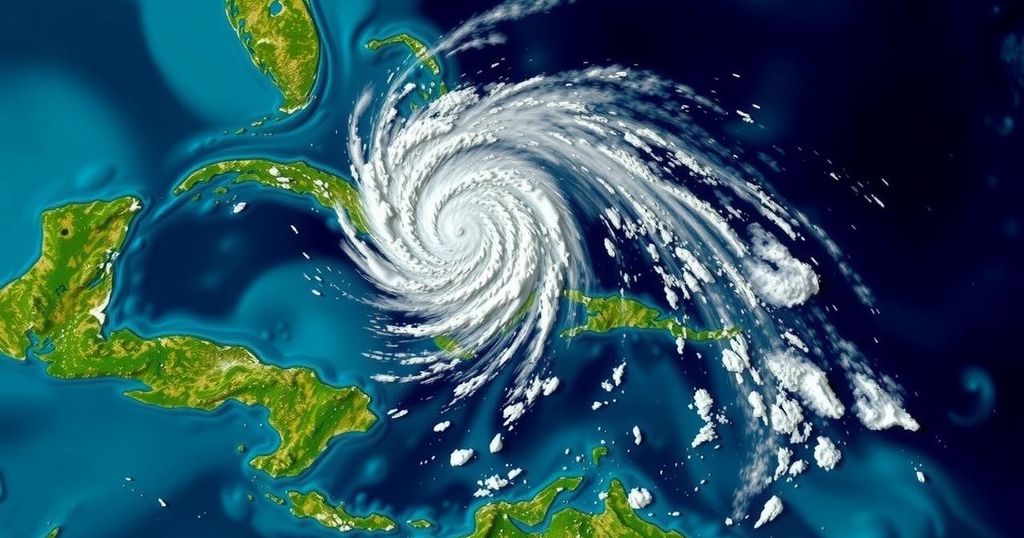Tropical Storm Oscar Disintegrates After Causing Fatalities and Flooding in Cuba

Tropical Storm Oscar weakened significantly as it traveled toward the Bahamas after wreaking havoc in Cuba, resulting in six fatalities and heavy rainfall. The storm, noted for being the smallest recorded hurricane, caused major flooding and garnered attention due to unexpected forecasting failures. Another storm may form soon, as experts predict an above-average hurricane season.
Tropical Storm Oscar significantly weakened on Tuesday after making landfall in Cuba as a Category 1 hurricane, resulting in the tragic loss of at least six lives and causing extensive rainfall on the island, which was already grappling with a substantial power outage. By Tuesday afternoon, the remnants of Oscar were identified approximately 75 miles (115 kilometers) east-southeast of Long Island in the Bahamas, with maximum sustained winds diminishing to 35 mph (55 kph) as they moved northeast at a rate of 12 mph (19 kph), according to the National Hurricane Center in Miami. The storm’s remnants are anticipated to bring as much as 4 inches (10 centimeters) of rain to parts of the southeastern Bahamas and the Turks and Caicos Islands. Oscar was notably the smallest recorded hurricane, with a wind field measuring only around 6 miles (10 kilometers) across. Its landfall on Grand Inagua Island in the Bahamas on Saturday, followed by a second landfall in eastern Cuba late on Sunday, caught many meteorological experts off guard. Michael Lowry, a hurricane specialist, remarked on this unpredictability, stating, “It’s not often we see a colossal failure in hurricane forecasting.” He indicated that no predictive models had suggested that Oscar would intensify into a hurricane. The storm deposited at least 15 inches (38 centimeters) of rain in regions of eastern Cuba on Monday, leading to warnings of severe flooding and potential landslides. The fatalities resulting from the storm were recorded in Guantánamo. This incident occurred amidst Cuba’s ongoing recovery from a large-scale blackout that had incited small protests, prompting a stern warning from the government against any dissent. Oscar is classified as the 15th named storm and the 10th hurricane of the Atlantic hurricane season, which spans from June 1 to November 30. Long-range forecasts suggest the possibility of another storm forming in the central Caribbean within the next week. Mr. Lowry remarked, “One last gasp may be in store for the Atlantic as we turn the calendar to November.” An above-average Atlantic hurricane season was predicted by the National Oceanic and Atmospheric Administration due to historically high ocean temperatures, forecasting 17 to 25 named storms, including four to seven major hurricanes classified as Category 3 or higher. Concurrently, Tropical Storm Kristy was observed over the open waters of the Pacific Ocean, located 470 miles (755 kilometers) west-southwest of Acapulco, Mexico. As of Tuesday, Kristy possessed maximum sustained winds of 60 mph (95 kph) and was advancing westward at a velocity of 16 mph (26 kph), with expectations of further intensification into a hurricane by that evening.
Tropical Storm Oscar is part of the Atlantic hurricane season, which runs from June 1 to November 30. This season has been characterized by warmer ocean temperatures, which contribute to above-average storm formation. The event surrounding Oscar is significant as it highlights the unpredictability of weather systems and the challenges faced in hurricane forecasting. The incident underscores the vulnerabilities of regions like Cuba, particularly in light of ongoing infrastructural issues such as power outages, and the socio-political ramifications stemming from natural disasters.
In summary, Tropical Storm Oscar, after a brief but impactful existence, caused considerable devastation in Cuba and raised concerns about future storm activity in the Atlantic. The storm demonstrated the unpredictability of hurricane forecasting and necessitated vigilance as another potential storm may develop in coming days. This highlights the importance of preparedness in regions often affected by such weather phenomena, especially amidst existing local challenges.
Original Source: www.ivpressonline.com








